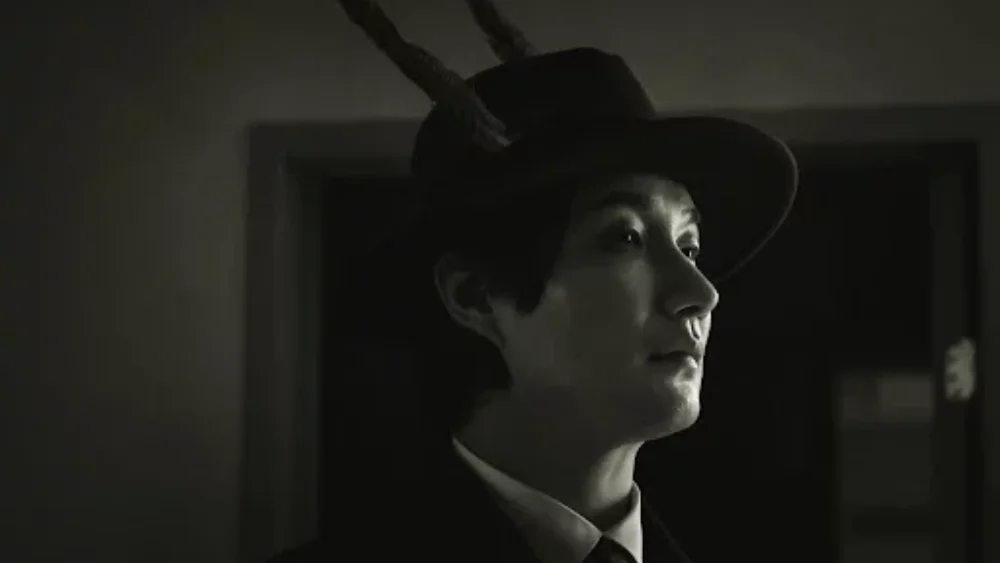Through the Looking Glass: The Tenants’ Surrealist & Phantasmagorical Vision of the South Korean Economic Crisis
By Hong Wan Jing

The Tenants (세입자, 2023): Embark on a 90-minute surreal odyssey into a dystopian realm, where characters recalling the children’s novel Alice in Wonderland grapple with grown-up troubles like rent, landlords, and colonic hypersensitivity. In the monochrome setup of this film, we find a compelling case study of the housing crisis besieging Korean young adults.
Director Yoon Eun-kyung explores dark and complex narratives in The Tenants, creating a bizarre world within which her characters must navigate. Our protagonist (Kim Dae-geon), lives in a typical apartment in a city where hope seems to have taken an extended vacation. Pollution taints the air, the economy meanders sluggishly, the cost of living soars, and fatigue is a constant companion. A quintessential twenty-something, he pushes through the monotony of his office job, fuelled by the ambition to ascend to power and adorn office walls with his portraits. Compounding his troubles, his 8-year-old landlord threatens a rent hike, compelling him to exploit a legal loophole by subletting a portion of his living space to avoid eviction. Enter a newlywed couple who not only strip him of bathroom privileges as they sublet his bathroom, but also rent out the previously undiscovered attic, accessible only through the bathroom, to a sub-subtenant – all with a few tricks up their (unusually long) sleeves.
Yoon’s choice of black-and-white film faithfully mirrors the dreariness of his daily existence. More importantly, it shatters the comfort of conventional colour representation. This deliberate decision serves as a constant reminder that viewers are not mere witnesses to reality unfolding, but active participants stepping into the surreal realm of cinematic imagination.
Living in this dystopian city are the unmistakable titular (sub-)tenants: a newlywed couple. Their living conditions vividly capture the reality and absurdity of economic struggles experienced by young Koreans. The couple, for instance, cohabits in a claustrophobic bathroom with the wife nestled in the bathtub as the husband situates himself beside the toilet bowl. The film’s narrative is peppered with unexpected touches that create a comical ambience, like the protagonist holographically calling his 8-year-old landlord to discuss the lease or the infusion of serene and upbeat K-Drama music amid the protagonist’s despondent life narration.
These surreal elements create a barrier between reality and the economic struggles depicted in the film, making social commentary more palatable. Surrealism is a narrative device that strategically merges dreamlike visuals with harsh reality to juxtapose them. Viewers are jarringly awakened to the profound echoes of these seemingly exaggerated social issues’ presence in the real world, as they emerge from their film-induced fever dream.
Yoon’s portrayal of life in a struggling South Korean neoliberal economy, is echoed in both contemporary films like Bong Joon-ho’s Parasite (2019) and his earlier works like Mother (2009), as well as the Netflix hit series Squid Game (2021, dir. Hwang Dong-hyuk). Aligned with the concept of ‘Dirt Spoon Cinema’2, coined by New York Times writer Bryan X. Chen and adapted from a local idiom “born with a silver spoon in their mouth”, these films depict the lives of the poor in Korea. It is not a far cry from reality; a 2022 survey by the Korean National Youth Policy revealed that 43% of Korean youths grapple with financial strain and rent in Seoul has been steadily increasing for 25 consecutive weeks as of November 2023.1 The Tenants serves as a reflection of this grim economic state. The film, along with others termed ‘Dirt Spoon Cinema’, may be seen as a collective call for attention to these dire economic challenges.
In crafting the filmic phantasmagoria that is The Tenants, Yoon employs black-and-white aesthetics and eccentric characters to magnify Korea’s economic and housing crisis. It emerges as a hidden gem, necessitating a deeper understanding of Korea’s economic context to be fully appreciated. While Yoon’s films have yet gained mainstream appeal, her capable direction shines through as she takes the audience on a surrealist odyssey.
1 Byun, H. (2022, February). 40% of Young Koreans Feel Poor. The Korea Herald.
2 Chen, B. X. (2019, October). Parasite and South Korea’s Income Gap: Call it Dirt Spoon Cinema. New York Times.